
Ah, aphids. We all know them, and we all dread them. These tiny bugs can cause massive damage to many garden plants – especially tomatoes.
Tomato blooms attract aphids to your garden, and they even enjoy sucking the sap from young leaves and fruits. But as annoying as aphids may seem, there are several ways to evict them from your plants, or stop them from taking up residence in the first place.
What are Aphids?
Aphids are small pests belonging to the Aphididae family. There are over 4000 species worldwide, preferring moderate, warm climates – much like humans.
Even though they are quite small, their large groups are easy to spot.
Hiding out, aphids love to settle on new stems and on the underside of tomato leaves. If you’re unsure of which bug you’re facing, their pear-shaped bodies are a dead giveaway. The different species have varying colors, including pink, orange, and black, but the most common ones are often green.
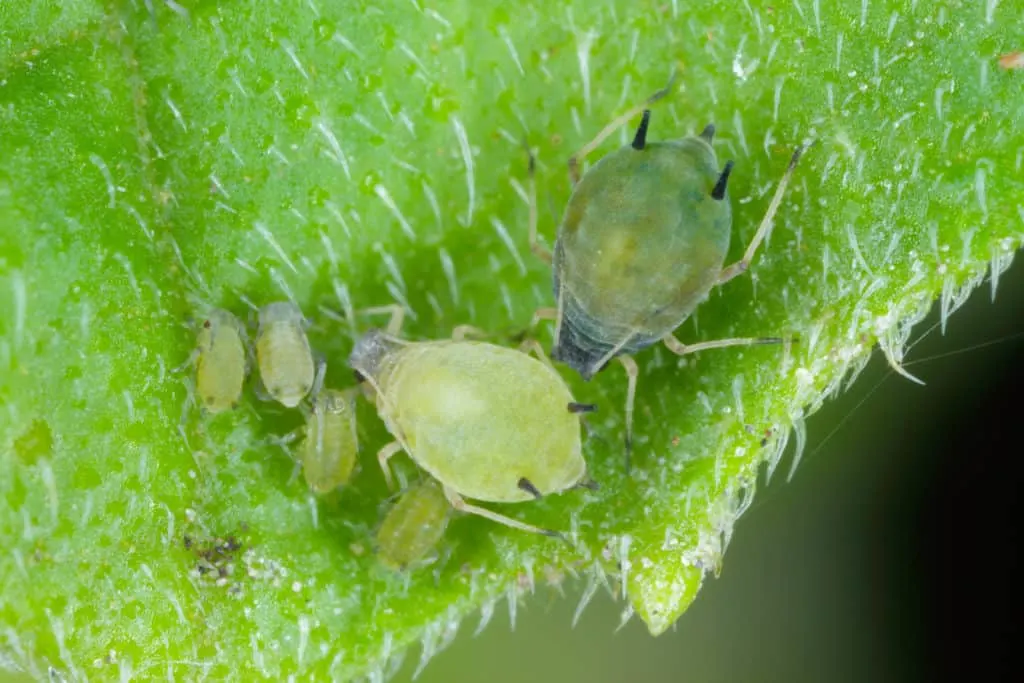
Small infestations of aphids are not a major concern, and they aren’t too difficult to get rid of. However, they reproduce extremely quickly, so infestations won’t stay small for long. Female aphids give birth to nymphs. These tiny aphids resemble adults but are much smaller, maturing in three weeks.
Once there are too many bugs in one area, they develop wings and spread to form colonies in new areas – such as your tomato garden.
Why Are Aphids So Destructive?
Aphid colonies grow incredibly fast, so their management and eradication can be tricky.
They tend to spread several diseases between gardens, such as mosaic viruses. The viruses are carried by host aphids as they suck juices from the leaves, transferring to other plants and infecting them immediately.
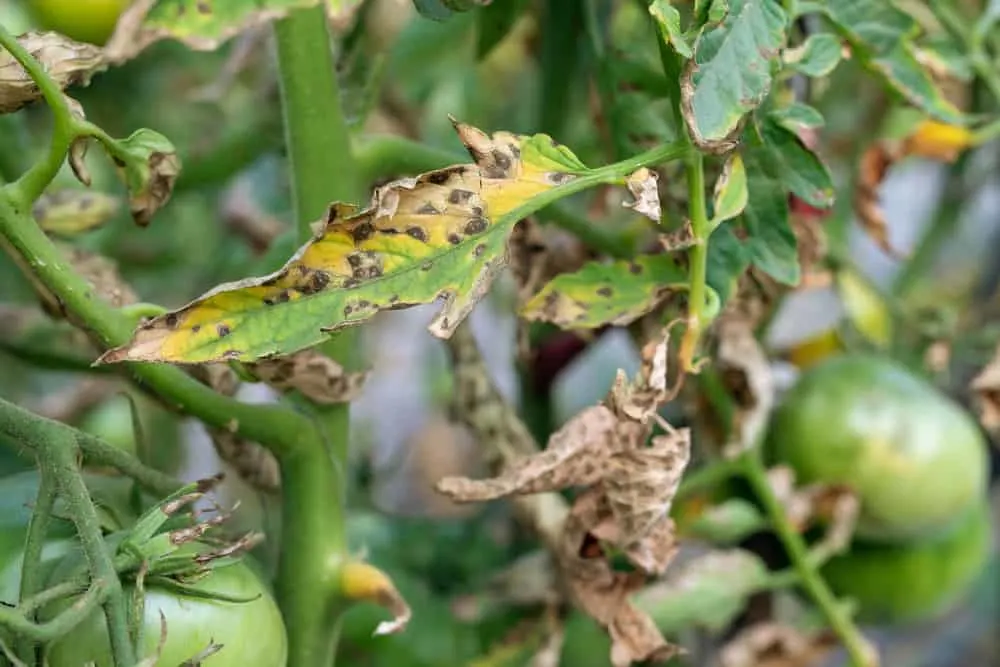
However, the main concern is their eating habits. Aphids reside on the underside of leaves, allowing them to suck the sap from the leaves undetected. Large infestations will cause leaves to wilt and yellow. New growth may become stunted. Even worse, tomato yields may decrease, or the fruits will become deformed.
A residue left on your leaves or tomato stems is a sure-fire sign that aphids have taken residence in your garden. This residue is known as ‘honeydew’ – another name for aphid waste. This honeydew attracts other pesky critters, such as ants. Further, the sticky liquid can cause mold to grow, turning the leaves and stems black.
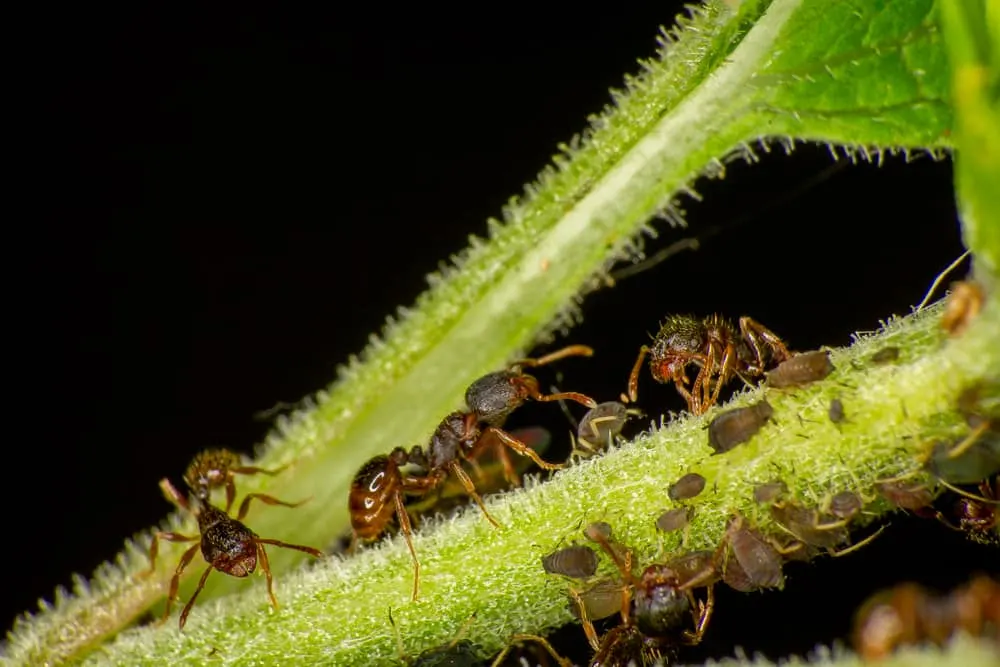
5 Ways To Control and Get Rid of Aphids On Tomato Plants
1. Hand Removal
Small aphid infestations are easy to manage and can generally be handled manually. You can easily pick them off and squish them between your fingers. Alternatively, if you’re squeamish handling bugs, wipe the affected areas with a wet cloth and a small amount of dish soap.
Spraying aphids off with a water spray bottle is another option. This removes the pests without damaging the delicate parts of your plant. Be careful how and where you spray the water, as you may simply facilitate the spread of these pests to the rest of your garden.
2. Oil-Based Natural Sprays

Larger infestations require more serious measures.
Neem oil is a great addition to your pest-fighting kit. It’s organic and won’t damage your tomatoes or deter other beneficial insects (more on that later). It kills aphids in all forms of development by suffocating them and halting reproduction.
Simply dilute one tablespoon of neem oil in two cups of water. Spray the solution all over the plant, focusing on the underside of the leaves, once a week.
Horticultural oils are slightly different, usually vegetable-based. These oils suffocate the aphids, eventually killing them. These oils also remove the mold that develops during aphid infestations too – solving two problems with one fix.
Do not apply oil based treatments in extreme heat, or during the hottest part of the day, as it will cause the leaves to burn.
3. Alcohol Sprays
Rubbing alcohol is an easy and affordable solution to control aphid infestations. Add ethanol to your spray bottle, mixing equal parts alcohol and water. To make the mixture even more effective, add a tablespoon of dish soap.
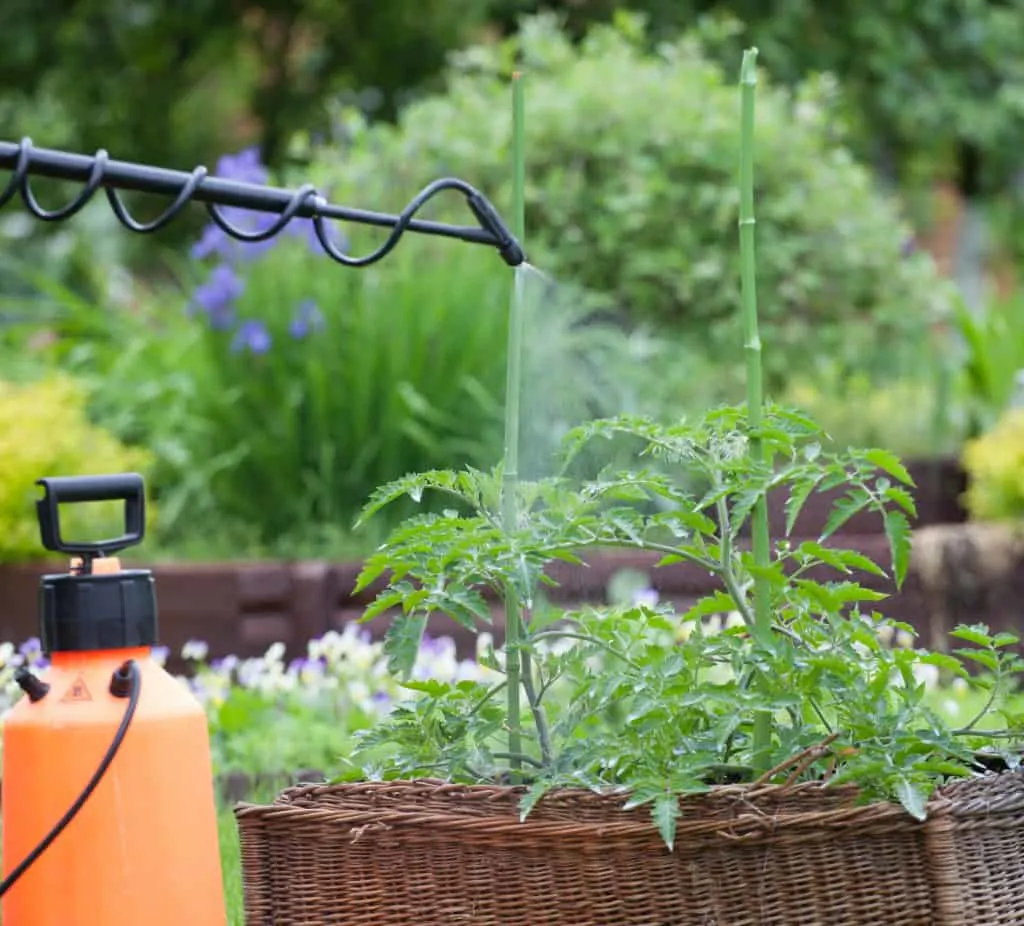
As with oil-based solutions, avoid spraying during the hottest times of the day.
4. Natural Predators and Companion Plants
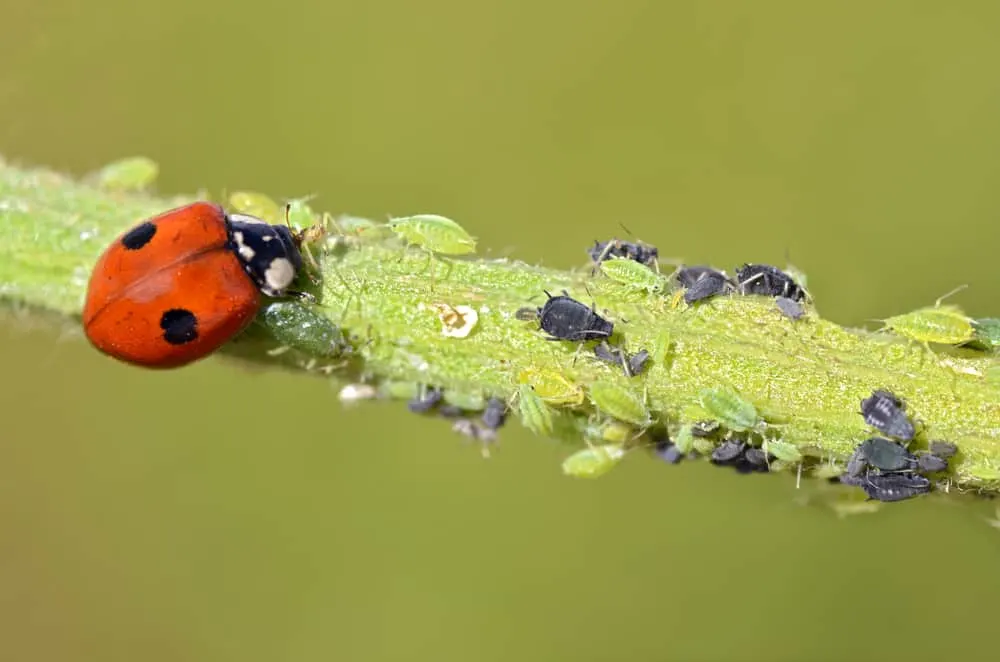
Beneficial insects are your garden’s best friend. Ladybugs, lacewings, and parasitic wasps are great predators to have in your garden, and they love eating aphids. Attract these good bugs by planting catnip, daisies, and marigolds in your garden.
Another great way to prevent aphids is planting plants that repel them. This includes chives and marigolds. The smell of these plants and flowers repel the aphids and various other insects.
Alternatively, choose plants that aphids love and place them nearby to draw them away from your tomatoes, such as nasturtium.
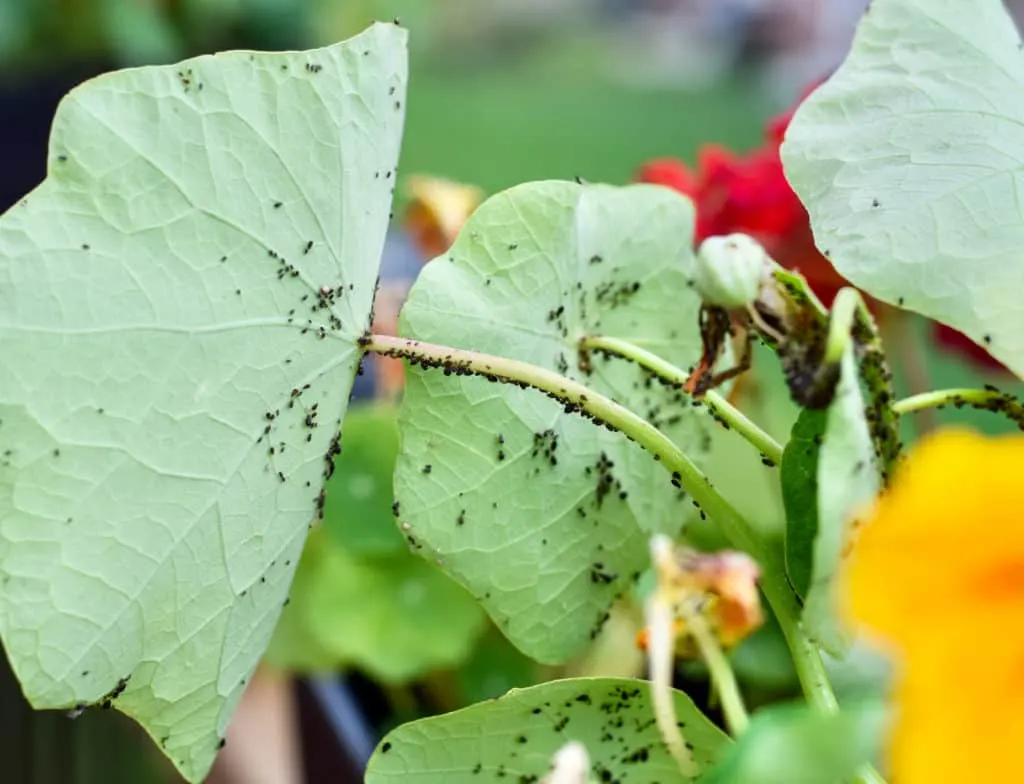
5. Traps and Row Covers
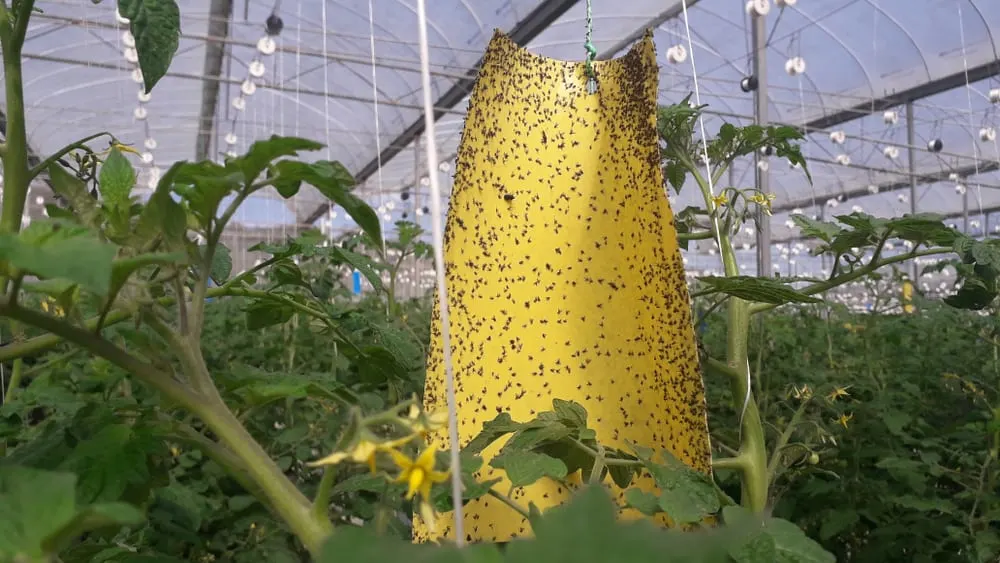
Yellow sticky boards and row covers can control and even prevent aphids. Sticky boards attract and catch aphids before they settle on your tomato plants. However, as these boards are reflective, they should be placed with caution. Extreme heat can reflect off the surface and burn your leaves or fruits.
Row covers are also a great addition to your tomato garden as they hold several benefits – including preventing aphids. Not only will they reduce pests, but they also protect tomatoes from excessive sun and heat.
Preventing Aphids
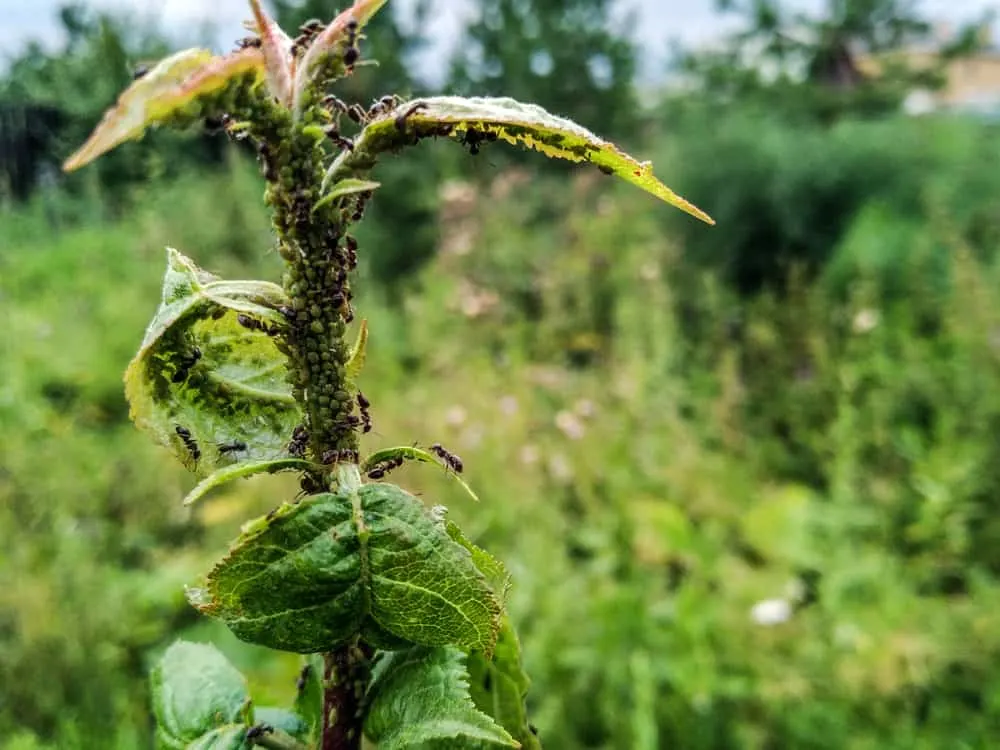
Aphids may not be totally destructive to the health of your tomato plants, but they are certainly a nuisance. It is far easier to prevent them from spreading than to tackle them once they have taken hold. Implement these preventative measures to deter aphids and other similar pests:
- Plant one of these eight tomato companion plants to deter aphids.
- Introduce beneficial insects that feed on aphids in your garden and do what you can to encourage them to stay. You can buy ladybugs online and release them into your tomato garden.
- Spray natural sprays (neem and horticultural oils), even if there are no signs of infestation. These can kill overwintering aphids and, if used correctly, have no negative side effects.
- Introduce sticky traps before an infestation occurs.
- Place row covers over tomato plants right after planting. This will also protect them from weather changes that may negatively affect growth.
These methods of control will ensure you can grow your tomatoes without fear of aphid destruction.
